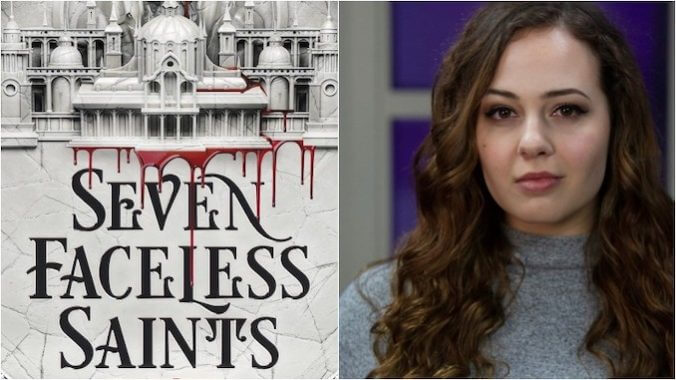M.K. Lobb Takes Us Inside the World of Seven Faceless Saints
Photo: Rob Boyce
Dark YA fantasy Seven Faceless Saints is set in a richly detailed magical world with a complex political hierarchy. The city of Ombrazia is built around the worship of seven gods, who have each gifted their descendants—known as “disciples”—-with specific kinds of magic. Unfortunately, those without similar gifts are discriminated against as part of a lesser caste known as the “unfavored,” citizens who are destined to live lives of poverty and strike, with their sons and daughters sent to battle and die in the city’s seemingly endless war with a Northern kingdom.
But when a disciple of Death is killed, the connections between his death and the murders of several unfavored raise uncomfortable questions about what’s going on in the city—and draw former childhood sweethearts Rossana Lacertosa, a disciple of Patience, and security official Damian Venturi back into each others’ lives. A story that’s one part murder mystery, one part enemies-to-lovers romance, and one part furious treatise about the unfair and exploitative ways society treats those it deems lesser, Seven Faceless Saints is a fast-paced, twisty fantasy with a message at its heart.
We got the chance to chat with the author herself about the world of Ombrazia, Damian and Roz’s tempestuous relationship, and what we can expect from the sequel.
![]()
Paste Magazine: Tell us a bit about where the inspiration for Seven Faceless Saints came from. What made you want to tell this story?
M.K. Lobb: I had already written quite a few manuscripts by the time I wrote this book, and none of them had been successful. I went into Seven Faceless Saints with the idea that this was going to be a story just for me—a story full of all the things I love about young adult fantasy.
I had it in my head that I wanted to write a murder mystery, but I didn’t immediately know what that would look like. What I did know was that I wanted a darkly lush world, an enemies-to-lovers romance, a belief system I could work to unravel, and characters I could pour my whole self into. I always say that Roz is my rage, and Damian my regret—-that could not be more true, and writing them was almost cathartic for me.
Paste: I love the intricate nature of the world-building in this book — from the setup of Ombrazia itself to the history of the saints and the magic of their various disciples—-how much time did you spend plotting all this out? (And how much of it did you have to leave on the cutting room floor?)
Lobb: I take a lot of my world-building inspiration from real history, so the city of Ombrazia is actually inspired by Florence, Italy back when it was run by seven major guilds, or arti maggiori. These guilds each had a different skill, and they had a ton of power over the city’s economy at the time. I ran with this general concept but decided to separate my guilds by magic and assigned each of them a patron saint.
It definitely took a lot of time to fine-tune, because you really have to strike the right balance between communicating all the necessary facts without info-dumping. And of course, that happy medium is so subjective! There’s so much that ended up getting cut, including all the real historical elements. Combined with the magic system, I realized it was just getting too complicated. That said, I think it’s always better to over-plot and then take what you need.
Paste: I’m hoping the ending to this one means we might learn a bit more about the saints and their history in the Seven Faceless Saints sequel? (Warring gods are a weakness of mine!)
-

-

-

-

-

-

-

-

-

-

-

-

-

-

-

-

-

-

-

-

-

-

-

-

-

-

-

-

-

-

-

-

-

-

-

-

-

-

-

-








































